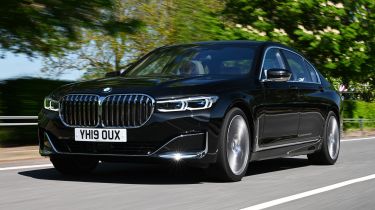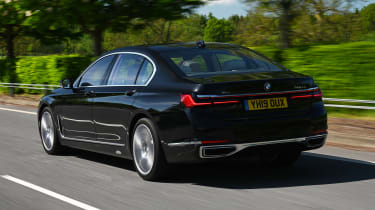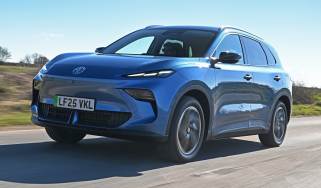BMW 7 Series hybrid review
The BMW 7 Series hybrid isn’t as comfortable as its Mercedes S-Class rival, but a big price difference tips the balance in its favour

Pros
- Good electric range
- Low company-car tax
- Undercuts S-Class on price
Cons
- S-Class has better ride
- BMW styling divides opinion
- Fast-charging cable costs extra
| Car type | Electric range | Fuel economy | CO2 emissions |
|---|---|---|---|
| Plug-in hybrid | 29-32 miles | 118-141mpg | 45-54g/km |
The BMW 7 Series has been a step behind its main rival – the Mercedes S-Class – but the arrival of a mid-life facelift in 2019 threatened to shift the balance of power between two of the most luxurious plug-in hybrids on sale. BMW said the changes made to the rear-wheel-drive 745e – as well as the long-wheelbase, all-wheel-drive 745Le – were the most sweeping it has ever applied to a model update.
On the outside – an area where BMWs across the board have divided opinion lately – the front end is 50mm taller than before, the front grille is 40% bigger and the headlights have been slimmed down for a sharper appearance. New side skirts and a thinner LED tail-light strip are included, too, with chrome additions completing the look.
However, changes to the powertrain are the most significant of all: the old, lacklustre 2.0-litre petrol engine has been replaced with a 3.0-litre straight-six producing 282bhp. It’s joined by a 111bhp electric motor, with power sent through an eight-speed automatic gearbox for a 0-62mph time of 5.1 seconds and a top speed of 155mph.
Meanwhile, official CO2 emissions are down to 45 and 54g/km for the 745e and 745Le respectively, ensuring free access to the London Congestion Charge zone until October 2021. Fuel economy is rated at 141mpg and 118mpg respectively for the two models.
With a 12kWh battery, the BMW 7 Series hybrid will officially return between 29 and 32 miles of electric, zero-emissions range: in real-world driving, we’ve seen around 25 miles, although you’ll likely achieve more if you stick to town and city roads. The 7 Series hybrid is capable of speeds up to 68mph without assistance from the engine, too.
As well as an electric-only setting, drivers can choose hybrid and sport modes, with the former maximising efficiency and the latter delivering peak performance. There’s also a ‘Battery Control’ button that can charge the 7 Series’s cells on the move, with drivers able to determine how much (between 30 and 100%) charge they want from the engine.
You can of course charge the 7 Series hybrid using a home wallbox or public charger, but rather stingily BMW makes you pay extra to upgrade from the slow three-pin cable provided to a faster Type 2 connector.
While there are pure petrol and diesel versions of the 7 Series, the plug-in hybrid model is the pick of the range: it sails around town effortlessly in electric mode, with the switch to hybrid mode almost imperceptible at low speeds. When you do ask for a bit more performance, there’s a satisfying roar from the engine, and the 7 Series hybrid feels suitably fast for a car of its size.
As is so often the case, the 7 Series plug-in hybrid is slightly heavier due to the inclusion of the battery, which also reduces boot space slightly to 420 litres. But despite the added bulk, the latest model handles extremely well, with body lean in corners controlled nicely even when the air suspension is placed in its softest setting.
Thicker glass windows and extra sound insulation ensure that less noise enters the car, however the Mercedes S-Class still has the 7 Series beaten on ride comfort: the Mercedes' seats are more comfortable, and the BMW doesn’t absorb bumps in the road as well. Alterations inside are minimal, with the introduction of BMW’s iDrive infotainment system and a new digital screen for the dials the only obvious changes. The quality of the leathers and metals used is excellent – as you'd expect for a car at this price point – although the design doesn’t feel as bespoke as it should.
Adaptive LED headlights, 360-degree parking cameras, a Harman/Kardon audio system, wireless smartphone charging and soft-closing doors are all on the standard kit list. Laser headlights are an option, while the ‘Rear Seat Entertainment Experience’ adds two 10.1-inch infotainment screens in the rear, with another tablet with which to control them. Business buyers might also consider the ‘Rear Seat Comfort Package Plus’, which adds two first-class, airline-style chairs aimed at transporting VIPs in complete luxury.
All things considered, the plug-in hybrid versions of the BMW 7 Series and Mercedes S-Class are incredibly closely matched, but there’s one area where the 7 Series has an advantage: price. The standard-wheelbase 745e is around £20,000 less expensive than the entry-level Mercedes S 560 e L, and even the more comparable 745Le costs less. You could argue that the S-Class is the slightly better car, but the 7 Series hybrid is vastly better value. For more on the BMW 7 Series hybrid, read on for the rest of our in-depth review...



